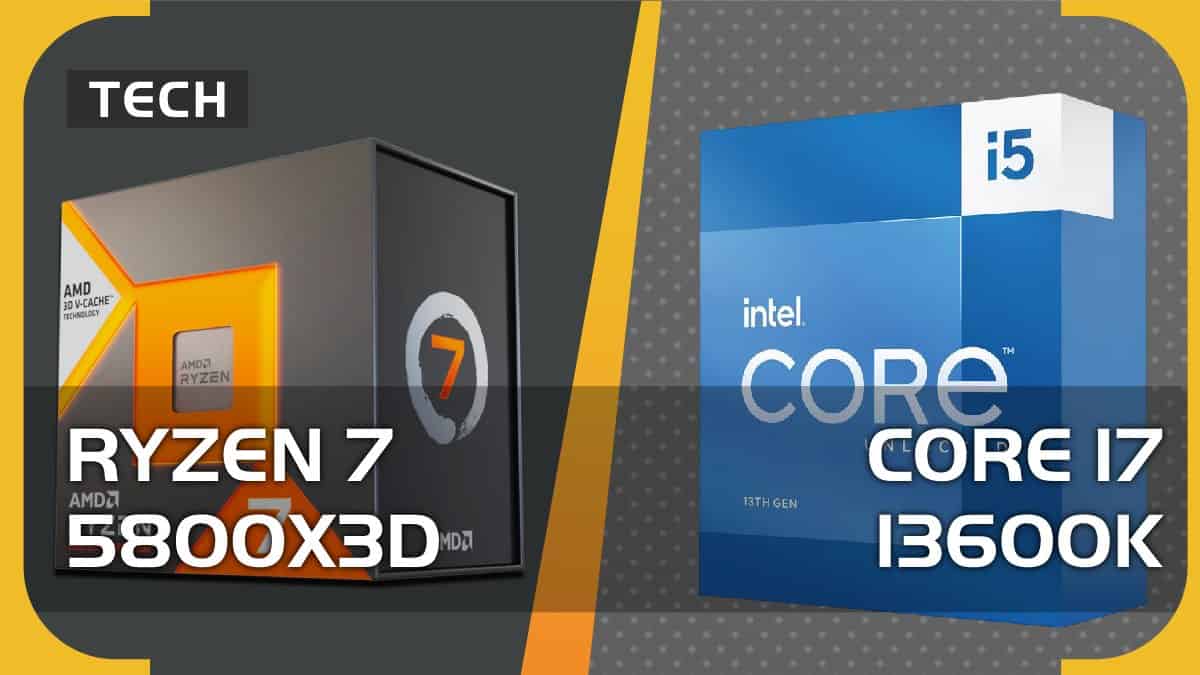You can trust VideoGamer. Our team of gaming experts spend hours testing and reviewing the latest games, to ensure you're reading the most comprehensive guide possible. Rest assured, all imagery and advice is unique and original. Check out how we test and review games here
If you’re wondering what the differences are between AMD Ryzen 7 7800X3D vs Core i7 13600K, then we’re here to help.
AMD is now releasing the final CPU in the triad of 7000 X3D CPUs, joining the ranks of the 7950X3D and 7900X3D processors. It’s due to come out on April 6th, and looks like it will be worth it, that is, if you’re happy to upgrade to an AM5 motherboard. Its wow factor comes from AMD’s 3D V-cache technology, meaning the 7800X3D is one speedy CPU that’s ideal for gaming.
So how does it compare to Intel’s Core i7 13600K that released back in October 2022. Its raw performance is pretty impressive, featuring a generous core count for the money. Like the 7800X3D, it’s a processor aimed at gamers, though potentially offers a stronger multi-threaded performance for other productivity tasks.
So which one comes out on top? Spoiler alert, we think it’s both. Both these chips offer a brilliant return on investment. Your choice between the two will depend on what your individual needs. So, before launching in, make sure you’ve got your priorities straight. Are you looking for a CPU specifically for gaming, content creation, video rendering, or a mixture of everything?
Whether you’re looking to upgrade your CPU to play some of 2023’s most CPU intensive games, or considering whether AMD’s 3D V-cache technology is worth it, we’ve got you covered. Below we’ll be guiding your decision by discussing the specs, price and overall performance of both CPUs.
We’ll look at everything from clock speed to TDP, and weigh up which CPU will be best suited to your needs.
So let’s jump right in! Here are the differences and similarities between Ryzen 7 7800X3D vs Core i7 13600K.
Ryzen 7 7800X3D vs Core i7 13600K – specs comparison
| Specs | Ryzen 7 7800X3D | Intel Core i7 13600K |
| Architecture | Zen 4 | Raptor Lake-S |
| Core Count | 8 | 14 |
| Thread Count | 16 | 20 |
| Base Clock | 4.4GHz | 3.5GHz |
| Boost Clock | 5GHz | 5.1GHz |
| L3 Cache | 96MB | 0 |
| TDP | 120W | 125W |
| iGPU | RDNA 2 | UHD Graphics 770 |
Above you can see a few notable points of difference between the Ryzen 7 7800X3D and Core i7 13600K. Below we’ll discuss how both CPUs generally perform before breaking down the above specs.
Ryzen 7 7800X3D vs Core i7 13600K – performance
After glancing at the above specs table, you’ll find that the Ryzen 7 7800X3D takes the edge in performance, particularly shining when it comes to its single-threaded performance. This gears it as a high-end, mid-range CPU given its price point. Its 3D V-Cache technology seriously delivers when it comes to gaming performance, though this does make it less suited to the tasks like graphics and video rendering.
This is where the Core i7-13600K really comes into its own, boasting a superior multi-threaded performance that is boosted by its E and P-cores. Though it doesn’t have L3 Cache, it can still sustain high clock speeds with its dedicated 2MB of L2 cache.
Overall, these CPUs boast a similar performance level, though the 7800X3D comes out on top for gaming performance.
Ryzen 7 7800X3D vs Core i7 13600K – architecture
The Ryzen 7 7800X3D boasts AMD’s latest Zen 4 architecture which marks a significant leap for the tech giant. The new architecture shifts to a 5nm process with support for premium features like DDR5 memory and PCIe Gen 5. You can also expect Zen 4 to make these CPUs significantly more powerful than their predecessors.
This all sounds very alluring, but of course, there’s a downside. Opting for the 7800X3D requires a DDR5 compatible motherboard that features an AM5 socket.
Read More: Best X670 motherboard – top AM5 motherboards
Meanwhile, the 13600K, as a ‘Raptor Lake-S’ processor boasts a hybrid architecture that divides the workload into P-cores and E-cores. Comparing CPU architecture is a bit like comparing apples and oranges and there isn’t really a clear winner in terms of standalone performance.
If you’re after the best value pick, Intel’s support for DDR4 and DDR5 memory is a potential dealbreaker. Opting for the 13600K saves you from upgrading your motherboard, meaning you can stick to mid-range options like the B660 models.
Ryzen 7 7800X3D vs Core i7 13600K – core count
Intel Core i7-13600K has a core count of 14, while the 7800X3D comes in slightly lower at 8. Overall, the 13600K has a generous core count for the money. This translates to the preferred choice for highly multi threaded workloads
The 7800X3D seems pretty mediocre until you notice its massive 96MB of L3 cache. In simple terms, more cache allows the cores to keep important data close, preventing them from having to access the much slower DRAM.
Ryzen 7 7800X3D vs Core i7 13600K – clock speed
The clock speed of a CPU, sometimes known as core speed, refers to the speed at which a CPU completes one processing cycle. It’s usually measured in gigahertz (GHz).
Essentially, the faster the core speed, the more calculations the chip can incomplete within a given timeframe. In layman’s terms, this translates to a better performance.
Read More: Best CPU for Nvidia RTX 3080 – our top picks
As you can see from our specs table, Ryzen and Intel are almost side by side, with a boost clock of 5.0Ghz and 5.1Ghz respectively. However, the 7800X3D has a slightly higher base clock speed of 4.4GHz compared to the 13600K’s 3.5GHz.
Moreover, since Zen 4 has the added boost of L3 cache, its cycles are more powerful, meaning the 7800X3D comes out on top, though the 13600K boasts superior multi-threaded performance.
Ryzen 7 7800X3D vs Core i7 13600K – TDP
TDP, (Thermal Design Power), refers to the amount of thermal energy that the CPU emits under normal operating conditions. As a general rule, the higher TDP, the more effort you have to put into cooling it.
Read More: Best thermal paste for CPU and GPU
Both CPUs boast fairly similar TDPs of 120W and 125W respectively, indicating their similar level of performance. Both will require pretty robust cooling solutions, especially the 7800X3D with its 3D V-cache technology. It definitely would be worth checking out WePC’s pick of the best coolers for Zen 4 and 13th Gen CPU coolers if your questioning your cooling solution.
Ryzen 7 7800X3D vs Core i7 13600K – price comparison
Since both CPUs are fairly evenly matched, the price will likely play a significant role in your final decision. At the time of writing, the Intel Core i7-13600K retails for just over $100 less than the expected price of the Ryzen 7 7800X3D.
Buy Now: Intel Core i7-13600K via Amazon
Meanwhile, AMD has said the Ryzen 7800X3D will have an MSRP of $449. Compared to Ryzen’s other X3D CPUs, this is pretty good value. However, don’t forget that you’ll have to upgrade to an AM5 motherboard if you haven’t already, potentially turning the 7800X3D into a more costly investment.
Final word – which CPU should you get?
Overall, it boils down to what your budget is and what you’re primarily using your CPU for. However, you can’t really go wrong with either processor.
If you’re a gamer, we seriously recommend the 7800X3D – AMD’s 3D V-cache technology is here to stay, so if you can afford it, we recommend upgrading to DDR5 sooner rather than later to make the most out of the platform.
The Core i7-13600K meanwhile is better suited for non-gaming purposes, while providing an all round gaming performance. This is because it has a higher multi-thread performance.






